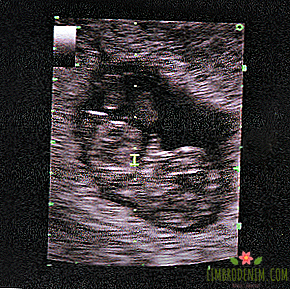No one to blame: Why miscarriages happen
Interruption of the desired pregnancy in the early period due not only to stress, but also a sense of resentment and guilt. The latter, unfortunately, is not uncommon and can only get worse if relatives or a doctor allow themselves unethical statements about women. Because of her vulnerable position, the patient can easily believe that it is she who is “to blame for everything.” We asked the experts how often the pregnancy stops developing, what reasons actually lead to this, and why a single miscarriage is not a reason to panic.

OLGA LUKINSKAYA

How often does this happen
According to various studies, in the early period (up to thirteen weeks) about 20% of pregnancies are terminated - and of all cases of abortion, 80% occur in the first trimester. Sometimes a woman does not have time to understand exactly what happened: as Anna Kannabikh, the gynecologist of the mobile clinic DOC +, notes, there is the so-called biochemical pregnancy, which is determined only by the level of the hormone HCG. Sometimes there is not even a delay in menstruation, and if such a pregnancy is interrupted, the woman may not notice any changes at all. A few decades ago, it was impossible to identify such cases - without the available test strips and ultrasound examinations, pregnancy was simply not diagnosed at such an early date.
Freezing, or undeveloped, pregnancy is a situation where the embryo or fetus has stopped developing, but there are no typical symptoms of miscarriage (pain, bleeding). According to the gynecologist and reproductologist Ekaterina Komarova, the now-frozen pregnancy has now been diagnosed more often - this is largely due to attempts to save any pregnancy in the early period. In other words, the fetus ceases to develop due to genetic abnormalities that are incompatible with life, and the drugs that the patient received, do not allow the body to reject it.
Why is this happening
The main cause of miscarriages is genetic abnormalities that can be inherited, and can occur spontaneously. Despite the fact that life expectancy and its quality have seriously improved over the last hundred years, age remains an important risk factor. New eggs over time does not appear, and genetic "damage" accumulate. Rarely, the pregnancy is terminated at the age of 20-30, by the age of thirty-five the risk of miscarriage reaches 20%, and after forty-five we are talking about 80% of the risks. Although there are other reasons, in more than 80% of cases, termination of pregnancy at a very early period (up to 6 weeks) is a genetic problem. This cause cannot be influenced, therefore in many countries they do not even try to maintain a pregnancy at this time.
Other causes are manageable, at least in part. These are smoking, alcohol intake (even in moderation) and drugs, serious comorbidities (obesity, uncontrolled diabetes mellitus) and some drugs for their treatment (such as cytotoxic drugs, retinoids or glucocorticoids). The health of a biological father can also play a role - after all, it gives half of the genetic material of the fetus. If a man is ill or practices bad habits, then the risk of mutations incompatible with life is higher. Therefore, the main evidence-based recommendation when planning a pregnancy is to lead a healthy lifestyle, starting three months before conception. Infections can play a role in miscarriage, although not as large as is commonly believed: women with HIV infection or chlamydia can, for example, endure and have a baby.

What is the threat of abortion
Bleeding with an already established pregnancy is most likely not a disaster. It occurs in a quarter of pregnant women in the first 20 weeks, and miscarriages end, according to various sources, from 12 to 57% of such cases. It is believed that it is abundant bleeding, and not hemorrhage, when there is little discharge, increases the risk of abortion. If bleeding occurred in the first trimester, but the fetal heart beat during an examination, the risk of losing pregnancy in the early period is 10% - almost like in women without signs of bleeding. As the doctor of medical sciences, gynecologist of the clinic "Dawn" Karina Bondarenko notes, about half of the cases of bleeding in early pregnancy are not a miscarriage, but simply the rejection of some part of the endometrium. While no one knows exactly why this is happening - perhaps because of the usual menstrual cycle, the biological rhythm does not have time to restructure completely.
With such symptoms, a second pregnancy test is done first (beta-hCG test), and then an ultrasound examination helps to determine where the pregnancy is located and whether it develops. If the pregnancy is intrauterine, and a heartbeat is noted on the ultrasound, then a threatened miscarriage (threatened miscarriage) is diagnosed and monitoring is prescribed. Recommendations to completely change the way of life or even to go to the hospital "to preserve" are not justified: today there are no interventions that have proven to prevent spontaneous miscarriage. Using progesterone, bed rest, taking vitamins do not help prevent pregnancy loss, and the appointment of muscle relaxants is ineffective when threatened with miscarriage.
When you need to be examined and what to treat
Loss of pregnancy causes a whole range of emotions, and many women want to find an unequivocal cause and eliminate it - but with a single miscarriage, we are most likely talking about the genetic causes described above. Karina Bondarenko says that after one spontaneous miscarriage, there is no need to rush into the investigation and look for any genetic or immunological risk factors - it is better to spend time and energy on your psycho-emotional recovery.
The main recommendation for preparing for pregnancy is a healthy lifestyle: a varied diet, regular exercise, avoiding alcohol and smoking. Chronic diseases, if any, need to be brought into a controlled state. Of course, after a spontaneous miscarriage, you need to make sure that the infection did not happen and the reproductive organs are in order: although in most cases the body rejects the non-viable embryo, sometimes it still needs medical or even surgical intervention.
Another thing is habitual miscarriage, when a miscarriage or a non-developing pregnancy occurs three times in a row or more. This situation requires a survey, and there are certain methods to save the next pregnancy. The Russian recommendations for the management of early abortion states that it is recommended that a couple be examined after two miscarriages in a row.

What does not lead to miscarriage
Everyone has heard scary stories about a familiar friend, whose miscarriage occurred after flying on an airplane, sex or playing sports. In fact, here, as often happens, the rule “after does not mean because of”. The coincidence of two events in time forces us to look for a connection between phenomena where it does not exist. Factors that are mistakenly associated with early pregnancy loss include air travel, blunt abdominal injuries, use of contraceptives (including hormonal) and HPV vaccination before pregnancy, sex and stress. Sports do not harm pregnancy, if they continue as before - even high-intensity workouts can continue. Work also does not threaten the course of pregnancy, if it is not associated with radiation or hazardous chemicals.
As Karina Bondarenko notes, if everything was so simple and these simple actions would be enough to terminate a pregnancy, then medical abortions would not be necessary either, as the patient could be recommended to fly somewhere or have sex. We add that the history of criminal abortions shows that getting rid of an unwanted pregnancy is not so easy - otherwise women would not go for actions with a deadly risk.
Psychological recovery
According to Ekaterina Komarova, the guilt felt by many Russian women after a miscarriage may be partly due to social attitudes. If a woman constantly hears that her value lies in the ability to bear children, then she will inevitably accept the impossibility of “fulfilling her duty” to her own account. The doctor notes that patients still often come to see a reproductologist without a partner, since men tend to disclaim responsibility: "I know that I am healthy, so figure it out yourself."
Loss of pregnancy can cause sadness, anger, resentment, or a sense of injustice in both partners, even if they have a different attitude toward pregnancy than the one described above. Psychological recovery is given to entire sections in the guidelines for the management of early miscarriages, and the Russian recommendations are no exception. Doctors and midwives are advised to carefully choose the words (for example, replace the term "spontaneous abortion" with "spontaneous miscarriage", and "missed abortion" - with "non-developing"). It is important to explain that the woman did not provoke a miscarriage by any actions, that her feelings are normal, and the probability of a healthy pregnancy in the future most likely remains high.
PHOTO: Saichol - stock.adobe.com (1, 2, 3)





